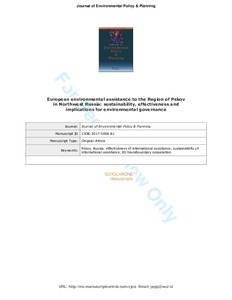Показать сокращенную информацию
European environmental assistance to the region of Pskov in northwest Russia: sustainability, effectiveness and implications for environmental governance
| Автор | Шкарубо, Антон Дмитриевич | |
| Автор | Лихачева, Ольга Викторовна | |
| Автор | Киреев, Виктор Витальевич | |
| Автор | Васильева, Татьяна Владимировна | |
| Дата внесения | 2019-07-01T07:22:23Z | |
| Дата, когда ресурс стал доступен | 2019-07-01T07:22:23Z | |
| Дата публикации | 2018-03 | |
| Библиографическое описание | Шкарубо, Антон Дмитриевич. European environmental assistance to the region of Pskov in northwest Russia: sustainability, effectiveness and implications for environmental governance [Текст] / Антон Дмитриевич Шкарубо, Ольга Викторовна Лихачева, Виктор Витальевич Киреев, Татьяна Владимировна Васильева // Journal of Environmental Policy & Planning. — 2018. — Т. 20 (№ 2). — С. 236-251 | |
| ISSN | 1523908X | |
| URI (для ссылок/цитирований) | https://www.tandfonline.com/doi/abs/10.1080/1523908X.2017.1398639 | |
| URI (для ссылок/цитирований) | https://elib.sfu-kras.ru/handle/2311/110616 | |
| Описание | Текст статьи не публикуется в открытом доступе в соответствии с политикой журнала. | |
| Аннотация | The paper explores the impact and sustainability of environmental assistance coming to Russia from EU-based public and private foundations. The geographical scope of the study was limited to Pskovskaya Oblast’; it encompassed all the assistance projects awarded in 1991-2016 involving beneficiaries from Pskovskaya Oblast’. This region is potentially an important target for EU investments in environmental infrastructure, due to its location by the EU border and high value of natural capital. The study demonstrates how the assumptions offered by the international aid literature (mostly derived from the global South) apply to Russia. We found major limitations to the assumption that co-financing provided by recipients ensures project effectiveness (demonstrating the acceptance of the donor’s agenda) or sustainability (providing interest to the maintenance of outputs). Tangible assets are normally co-financed only if the investment was in agenda anyway (and therefore the donor gets only time gains, although this can be a valid purpose too); soft outputs (plans, surveys, policies etc.) are usually co-financed in-kind, and therefore cannot secure any additional commitment. Likewise, physical infrastructure often ends up mismanaged due to low or no maintenance budgets available, while maintenance of soft outputs is too much dependent on contextual factors beyond the co-finance paradigm. | |
| Тема | Pskov | |
| Тема | Russia | |
| Тема | effectiveness of international assistance | |
| Тема | sustainability of international assistance | |
| Тема | EU transboundary cooperation | |
| Название | European environmental assistance to the region of Pskov in northwest Russia: sustainability, effectiveness and implications for environmental governance | |
| Тип | Journal Article | |
| Тип | Published Journal Article | |
| Страницы | 236-251 | |
| ГРНТИ | 87.01.75 | |
| Дата обновления | 2019-07-01T07:22:23Z | |
| DOI | 10.1080/1523908X.2017.1398639 | |
| Институт | Институт экологии и географии | |
| Подразделение | Кафедра экологии и природопользования | |
| Журнал | Journal of Environmental Policy & Planning | |
| Квартиль журнала в Scopus | Q2 | |
| Квартиль журнала в Web of Science | Q2 |

